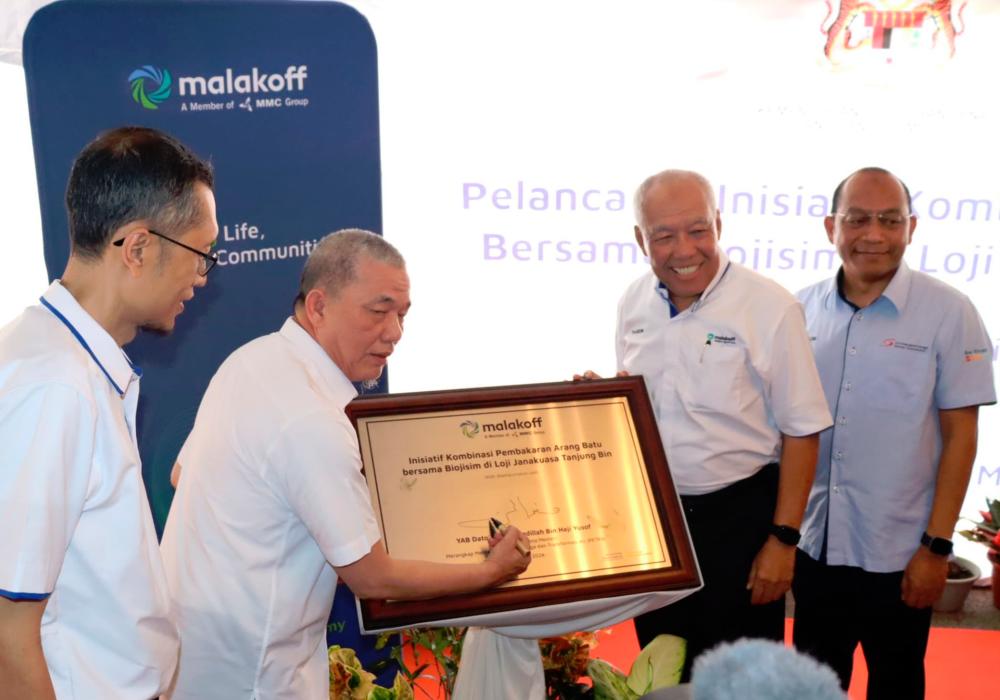KUALA LUMPUR: Malakoff Corporation Berhad today launched its Biomass Co-Firing project at its 2,100 MW coal-fired Tanjung Bin Power Plant (TBPP) in Pontian, Johor. This initiative, a flagship project of the National Energy Transition Roadmap (NETR), demonstrates Malakoff’s commitment to supporting the national target of reducing carbon intensity by 45% by 2030 and increasing the Renewable Energy (RE) capacity mix from 40% to 70% by 2050.
Deputy Prime Minister and Minister of Energy Transition and Water Transformation (PETRA), Datuk Sri Fadillah Yusof, launched the project during his working visit to TBPP. Malakoff chairman, Tan Sri Dr. Ahmad Tajuddin Ali, managing director & Group CEO Anwar Syahrin Abdul Ajib were present along with other energy industry stakeholders.
This flagship initiative aims to co-fire up to 15% biomass with coal at TBPP by 2027. After successfully completing a trial run with up to 0.5% biomass co-firing in December 2022, Malakoff completed the construction and commissioning of its 2% biomass co-firing installation in the first quarter of 2024, with the plan to increase further to 3% to 5% in 2025, ultimately reaching a target capacity of at least 15% by 2027.
The full-phase implementation of 15% biomass co-firing with coal is estimated to offset a significant amount of carbon dioxide equivalent (CO2e) emissions that is comparable to 141,536,250 of matured trees planted. It is also intended to enhance grid stability and align with
Malaysia’s commitment to a Just Energy Transition (JET), aiming for an equitable shift to a greener economy, inclusive opportunities, meaningful employment and addressing the Energy Trilemma of security, sustainability, and affordability.
Malakoff is currently actively exploring cutting-edge Japanese and European technologies in biomass co-firing and handling equipment to optimise efficiency during the commercial phase.
Innovations such as ‘smart silo systems’, capable of storing multiple types of biomass fuel, and the utilisation of torrified pellets, are being considered to streamline operations. These advancements have the potential to decrease our dependency on coal firing as the primary fuel
source for power plants, reflecting commitment to adopting new technologies for sustainable energy solutions.
Anwar Syahrin believes this initiative is a crucial step forward for the company to enhance the nation’s energy security while reducing carbon emissions.
“Recognising the importance of sustaining our contribution to Malaysia’s economic growth and ensuring energy security, especially with our 21% share of Peninsular Malaysia’s generation capacity, we made a decisive move. To remain relevant in the power industry, we are committed to transitioning to renewables and neutralising our carbon footprint, responding to the growing emphasis on sustainability and ESG principles,” he said.
In their thermal business, he added they have been focusing on increasing biomass co-firing capacity.
“By continuously evaluating alternative biomass fuels, we aim to gradually elevate co-firing ratios, targeting a minimum of 15% co-firing readiness by 2027. Ensuring the operational reliability of our plants still remains a priority, achieved through rigorous due diligence and planned maintenance outages. This approach not only enhances the stability of Malakoff’s facilities but also leverages and further develops our experienced technical skills,” said Anwar Syahrin.









